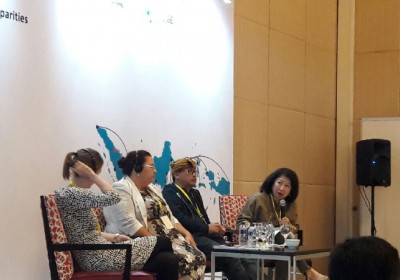Digital Technology Solves Disparity in Indonesia
July 10, 2018
Speakers in Inspire III discussion session entitled “Unlocking the Potential of the Digital Economy for Regional Development”, Indonesia Development Forum 2018, Tuesday, July 10, 2018.
Jakarta, July 10, 2018 - Digital technology development may bring tremendous positive impacts when used properly. Senior economist, Mari Elka Pangestu, said that digital technology does not only improve economy, but further, it gives access to information, ease in financial service, promotion, as well as getting a job.
“Although we are connected to the internet, it turns out that most of the people use it for social media rather than doing business. Despite so, it is still a huge potential to be unlocked,” she further explained during the Inspire III discussion session entitled “Unlocking the Potential of the Digital Economy for Regional Development,” Indonesia Development Forum 2018, on Tuesday, July 10, 2018.
Mari found that regions in eastern part of Indonesia are not as well-connected to internet as Java. To overcome this, Mari continued, innovation is crucial to reach out remote areas by using specific technology, such as internet balloon, drone, etc.
Another challenge is the lack of efficiency in e-commerce, which causes goods take long time before arriving at customer’s home; Users’ capacity needs to be upgraded as well. To solve this, Mari suggested all stakeholders to collaborate in building digital infrastructure, including logistic supply that covers technological facilities and cheap internet tariff, training for online entrepreneurs, as well as easiness of access to capital.
“To solve this, the key is collaboration: engaging government, private sector, and all stakeholders,” she concluded.
She also suggested that government should be more cautious in issuing policies regarding digital economy. The government also needs to issue regulations that protect creativity of local community. Nevertheless, it also needs to develop digital economy to compete with other countries.
The Founder of Common Room Networks Foundation, Gustaff Hariman Iskandar, explained that improvement of technology and digital economic sector may be the solution to solve disparity between urban and remote, rural areas. He raised the example of customary community of Ciptagelar, in Halimun Mountain, Sukabumi District, who are able to access information on agricultural technology on the internet. They learn about farming cycle from the internet to the extent that they are able to determine the right planting time that is harmonious with nature.
“As a result, when farms in other regions were affected by El-Nino, farmers in Ciptagelar benefited from increase of yields,” he said.
Indonesia is not the only country using digital technology to address disparity. Similar case also happens in Australia. July-Ann Lambourne, the founder of digital enterprise, enVizion, is often credited for introducing the technology to the locals in Torres Strait Island, Australia.
EnVizion provides free classes that aim to introduce digital literacy, followed by business and entrepreneurship mentoring. After individuals learn about digital literacy, Julie said, they can develop it into a business opportunity and sell the products online.
Unlocking the Potential of the Digital Economy for Regional Development is one of the sub-themes in the Indonesia Development Forum 2018. The forum was initiated by the National Development Planning Agency (Bappenas) with the support of the Government of Australia through Knowledge Sector Initiative (KSI). This year’s IDF is held under the grand title of “Pathways to Tackle Regional Disparity Across the Archipelago”.
IDF 2018 promotes acceleration of more equal and sustainable development in Indonesia that is based upon science, experiences, and facts. The results will be used as a reference to develop the Mid-Term Development Plan of 2020-2024.**
Indonesia’s Research Institutions Supporting the Development of the Electric Vehicle Industry
Indonesian Muslim Fashion and Cosmetics IKMs Shine at Dubai World Expo 2020
Govt Steps Up UMKM Transformation Efforts in the Midst of Pandemic Slowdown
Govt Encourages Promotion of IKM Products in Digital Era
Government Begins Developing Maritime Training Center in Makassar
Tweets by IDDevForum
